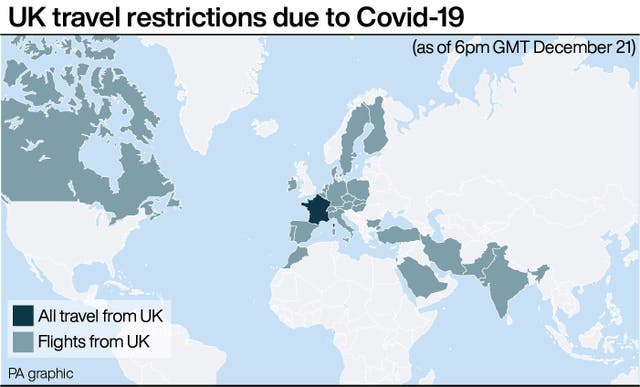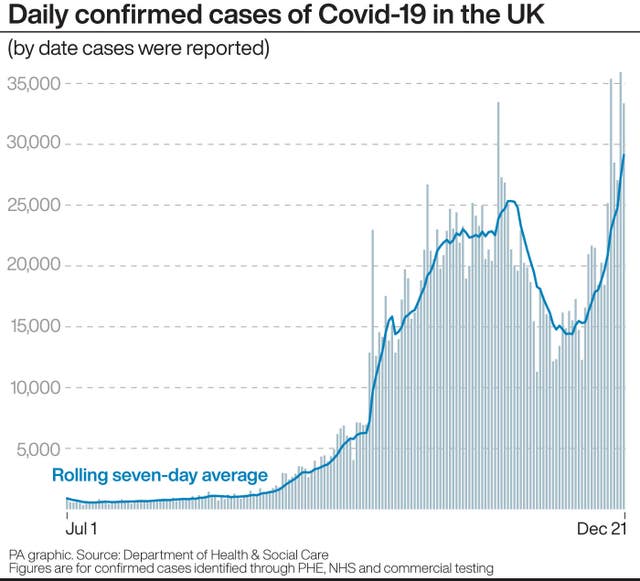Crisis talks with France will continue in an effort to resume trade flows across the Channel amid warnings that the border must be running again by Wednesday to avoid disruption to food supplies.
More than 1,500 lorries are backed up in Kent, unable to make the crossing to France, with drivers having spent a second night sleeping in their cabs.
Home secretary Priti Patel said the government is “speaking constantly” with France to achieve a resolution “in both our interests” to get freight moving again. And she defended the government’s handling of the pandemic, insisting ministers had been “ahead of the curve” in tackling coronavirus.
Banned flights and hauliers
More than 40 countries have banned flights from the UK due to a mutant variant of coronavirus (Covid-19) spreading through the country. But now the French government has also banned hauliers from crossing to mainland Europe.

Food supply disruptions
A possible solution could be mass testing of HGV drivers. The BBC reported that plans to reopen the border will come into effect from Wednesday, citing French Europe minister Clement Beaune.
Andrew Opie, director of food and sustainability at the British Retail Consortium, said the “borders really need to be running pretty much freely from tomorrow to assure us that there won’t be any disruption”.
He told BBC Radio 4’s Today programme: “There is a problem potentially directly after Christmas and that is really in fresh produce, so we’re talking here about things like salad, vegetables, fresh fruit, of which the vast majority come from Europe at this time.”
The main problem was empty lorries stuck in Kent unable to head over to the continent to reload with fresh supplies, he said.

Over 1000 lorry drivers stuck, without adequate toilet facilities or food
Patel told Sky News that talks would continue with France because “it’s in both our interests to carry on those discussions and negotiations and we will see what materialises today”.
The home secretary said that 650 lorries were queued on the M20 with 873 at a former airfield site in Manston, Kent.
She defended the response of ministers, telling BBC Radio 4’s Today: “The government has consistently throughout this year been ahead of the curve in terms of proactive measures with regards to coronavirus.”
She said that although 20% of goods come through the short straits, “there is plenty of food in the supermarkets”.
She added: “We have fresh produce come in through other routes as well, through air freight and not just through the short straits, so I think we have to just take a balanced approach to this.”
Rod McKenzie, managing director of the Road Haulage Association, told BBC Breakfast that stranded drivers had been offered “one cereal bar” by Kent County Council on Monday “which is a pretty poor effort, I think in terms of maintaining their morale, and their spirits”.
McKenzie said toilet facilities were also a “big issue” with concerns over health and cleanliness.
“Operation Brock”
Prime minister Boris Johnson spoke to French president Emmanuel Macron on Monday and stressed that the risks of transmission posed by a “solitary driver sitting alone in the cab are really very low”.
The World Health Organisation’s European chief Hans Kluge said limiting travel to contain the spread of the new variant was “prudent” until there was more information.
But he said the supply chains for “essential goods” and essential travel “should remain possible”.
The M20 in Kent was closed on Monday night to allow for the implementation of Operation Brock – contingency measures which involve using a moveable barrier to keep traffic moving on the motorway whenever there is disruption at the Channel.
Containing the new coronavirus strain
Meanwhile, scientific advisers continued to press the case for tougher restrictions in response to the VUI 202012/1 variant, which is 70% more infectious than previous strains.
The government’s chief scientific adviser, Sir Patrick Vallance, said we will need tougher restrictions across the UK. Cases of the mutant strain of Covid-19 are now appearing “everywhere” and it is more easily transmissable.
Professor John Edmunds, a member of the Sage scientific advisory panel, echoed that view. He told Today:
“Unfortunately, it does look like the virus is probably across the country already and so I do think that we might, unfortunately, have to impose tougher restrictions across the country.”
But the chief executive of the pharmaceutical firm behind the vaccine in the UK said the company was confident it would work against the new strain.
BioNTech boss Ugur Sahin said: “we don’t know at the moment if our vaccine is also able to provide protection against this new variant”. But because the proteins on the variant are 99% the same as the prevailing strains, the firm has “scientific confidence” in the vaccine.
More than 500,000 people have so far received the Pfizer/BioNTech jab in the UK.

The outlook for Christmas
London and parts of southern and eastern England entered the new Tier 4 lockdown regime at the weekend. This has effectively cancelled Christmas plans and imposed measures similar to the previous national lockdowns.
Scotland and Northern Ireland have already announced new lockdowns from Boxing Day. Meanwhile Wales’s tough restrictions will only ease up for Christmas Day before coming back in full force on the 26th.
The north of Ireland’s Executive voted against imposing a travel ban on Great Britain and the Republic of Ireland overnight. But it did agree to issue guidance warning against all but essential travel.
















